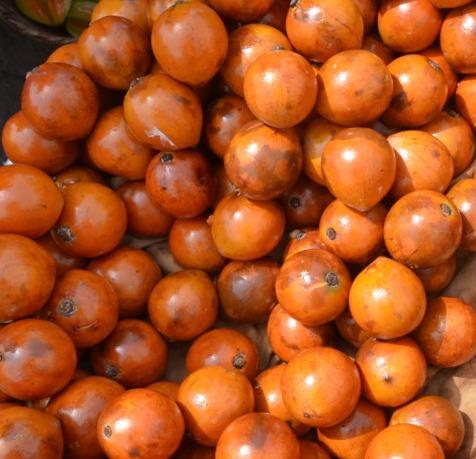The coconut tree, Cocos nucifera L., is a member of the palm tree family (Arecaceae). The term “coconut” can refer to the whole coconut palm, the seed or the fruit. It is ubiquitous in coastal tropical regions. It is called mosara in Hausa, aku beke or aku oyibo in Igbo and agbon in Yoruba.
Constituents
Phytochemical studies of the coconut revealed the presence of phenols, tannins, leucoanthocyanidins, flavonoids, triterpenes, steroids, alkaloids and saponins. Also present are vitamins B1, B2, B3, B5, B6, C, folic acid, lauric acid, alpha tocopherol, L-arginine, plant hormones (like auxin and cytokinin), enzymes (like acid phosphatase, catalase, dehydrogenase, peroxidase, RNA polymerases) and growth-promoting factors.
Other compounds identified in the leaf epicuticular wax were lupeol methylether, skimmiwallin, and isoskimmiwallin.

Preparations
The white endocap from the mature ripe fruit may be eaten raw, dried or roasted, alone or as an ingredient in food. It can be processed for oil and plant milk. The hard shell, mesocap, may be burnt to give charcoal .
Other products of coconut include tender coconut water, raw kernel, coconut cake, flakes, toddy and flour.
Pharmacological actions and medicinal uses
The coconut has cultural and religious significance in certain societies. It forms the basis of wedding and worship rituals in some cultures both within and outside Nigeria.
Studies have also demonstrated the usefulness of coconut in asthma, cough, cold, flu, bronchitis, sore throat, haemoptisis, haematimesis, ulcer, diarrhoea, stomach aches, alopecia, abscesses and injuries. It is reported to be useful also in the management of amenorrhea, dysmenorrhea, menstrual cycle disorders, and oral contraception.
In Mozambique, the fruit is consumed by men as an aphrodisiac. In Mexico, coconut is used to treat various disorders associated with urogenital tract infection by Trichomonas vaginalis. A decoction of the white flesh of the fruit is used in rural Malaysia to treat fever and malaria. Milk of young coconut is diuretic, laxative, anti-diarrhoeic and counteracts the effects of poison. The juice from a green coconut is given to women who have difficult pregnancies. Coconut is reported to be beneficial in diets for weight loss.
Previous studies have demonstrated that various extracts, fractions, and isolated compounds from different parts of the coconut tree (especially the fruit) have different activities, such as: analgesic, antipyretic, anti-inflammatory, antiarthritic, antinociceptive, antiosteoporosis, vasodilation, antibacterial, antifungal, antiviral, antiparasitic, antihelminthic, antidermatophytic, antioxidant, hypoglycemic, hepatoprotective, nephroprotective, antiseizure, immunostimulant and antitumor effects.
Because each part of C. nucifera has different constituents, the pharmacological effects of the plant vary according to the part of the plant evaluated.
Adverse effects
In some adults and children, eating coconuts might cause an allergic reaction. Symptoms may include skin rashes and difficulty breathing. Coconuts are high in saturated fat, a controversial fat that may be harmful if consumed in high amounts
Economic uses and potentials
Different parts of coconut have found use in the pharmaceutical, food, cosmetics and building industries. The presscake or copra meal is a good feed. Parts of the coconut have ornamental and agricultural (fertilizer) uses too.
Several countries’ economies are based on the coconut palm. As of 2006, the U.S. annually imported 190 million pounds of coconut oil, whose worldwide trade reached $20 million.
In Nigeria, a bag of 200 coconuts costs ₦23,000 – ₦35,000. Organic coconut flour costs between ₦2,500 and ₦7,000 per 500g/1kg. Coconut flakes cost ₦1,000 to ₦9,000 per 300g; while pure coconut oil costs between ₦3000 and ₦9,000 for 500ml.
Coconut, the tree of health, offers great potentials in cultivation, sales, manufacturing, exportation, research and development for individuals, corporate bodies and the government.











trusted india online pharmacies sildenafil without doctor prescription
tadalafil daily use: http://tadalafilonline20.com/ tadalafil generic